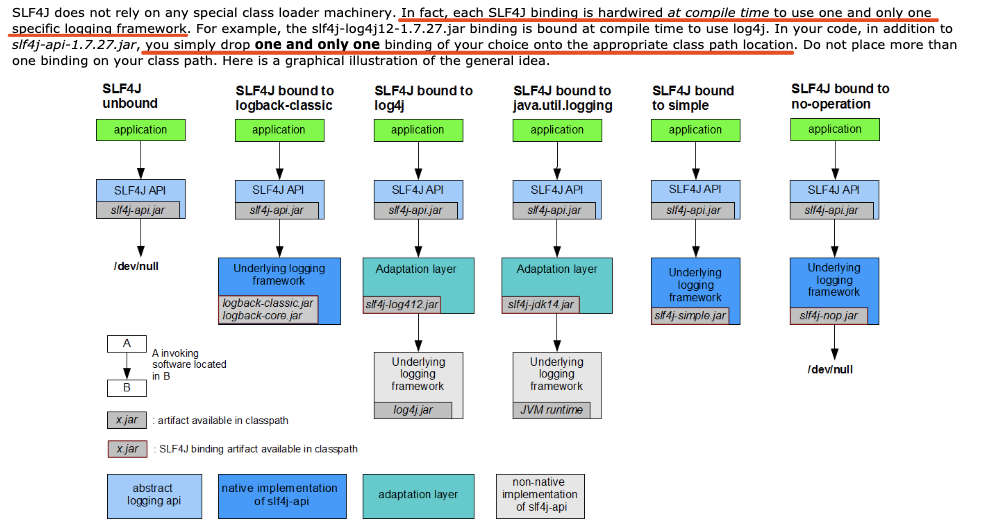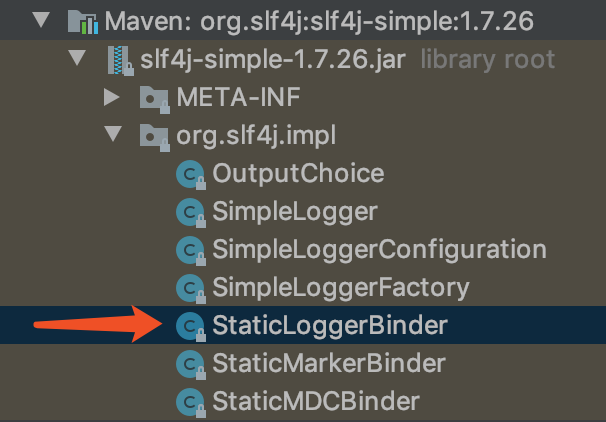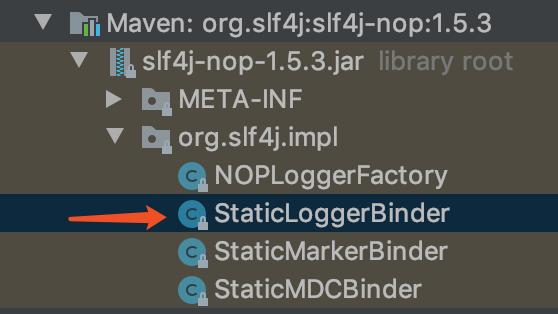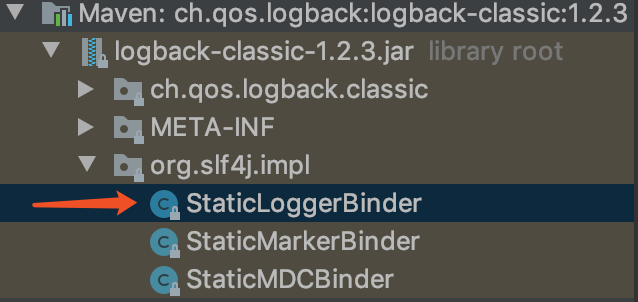源码解读SLF4J绑定日志实现的原理
一、导读
SLF4J: Class path contains multiple SLF4J bindings.
SLF4J: Found binding in [jar:file:/Users/abc/maven-repository/org/slf4j/slf4j-simple/1.7.26/slf4j-simple-1.7.26.jar!/org/slf4j/impl/StaticLoggerBinder.class]
SLF4J: Found binding in [jar:file:/Users/abc/maven-repository/org/apache/logging/log4j/log4j-slf4j-impl/2.7/log4j-slf4j-impl-2.7.jar!/org/slf4j/impl/StaticLoggerBinder.class]
SLF4J: See http://www.slf4j.org/codes.html#multiple_bindings for an explanation.
SLF4J: Actual binding is of type [org.slf4j.impl.SimpleLoggerFactory]


也就是说,当有多个日志实现时,SLF4J会在编译期随机选择其中的一个实现。那么,它到底是如何随机选择的呢?下面我们通过源码来分析。
二、源码分析
2.1 LoggerFactory.getLogger(this.getClass())
public static Logger getLogger(Class<?> clazz) {
Logger logger = getLogger(clazz.getName());
if (DETECT_LOGGER_NAME_MISMATCH) {
Class<?> autoComputedCallingClass = Util.getCallingClass();
if (autoComputedCallingClass != null && nonMatchingClasses(clazz, autoComputedCallingClass)) {
Util.report(String.format("Detected logger name mismatch. Given name: \"%s\"; computed name: \"%s\".", logger.getName(),
autoComputedCallingClass.getName()));
Util.report("See " + LOGGER_NAME_MISMATCH_URL + " for an explanation");
}
}
return logger;
}
2.2 LoggerFactory.bind()
private final static void bind() {
try {
Set<URL> staticLoggerBinderPathSet = null;
// skip check under android, see also
// http://jira.qos.ch/browse/SLF4J-328
if (!isAndroid()) {
staticLoggerBinderPathSet = findPossibleStaticLoggerBinderPathSet(); //在classpath下查找有多少个日志实现
reportMultipleBindingAmbiguity(staticLoggerBinderPathSet); //如果有多个日志实现,打印出来
}
// the next line does the binding。classpath下每个日志实现jar都会有org.slf4j.impl.StaticLoggerBinder类,这里会随机加载其中的一个。
StaticLoggerBinder.getSingleton();
INITIALIZATION_STATE = SUCCESSFUL_INITIALIZATION;
reportActualBinding(staticLoggerBinderPathSet);
fixSubstituteLoggers();
replayEvents();
// release all resources in SUBST_FACTORY
SUBST_FACTORY.clear();
} catch (NoClassDefFoundError ncde) { //如果在classpath下没有找到一个org.slf4j.impl.StaticLoggerBinder
String msg = ncde.getMessage();
if (messageContainsOrgSlf4jImplStaticLoggerBinder(msg)) {
INITIALIZATION_STATE = NOP_FALLBACK_INITIALIZATION;
Util.report("Failed to load class \"org.slf4j.impl.StaticLoggerBinder\".");
Util.report("Defaulting to no-operation (NOP) logger implementation");
Util.report("See " + NO_STATICLOGGERBINDER_URL + " for further details.");
} else {
failedBinding(ncde);
throw ncde;
}
} catch (java.lang.NoSuchMethodError nsme) {
String msg = nsme.getMessage();
if (msg != null && msg.contains("org.slf4j.impl.StaticLoggerBinder.getSingleton()")) {
INITIALIZATION_STATE = FAILED_INITIALIZATION;
Util.report("slf4j-api 1.6.x (or later) is incompatible with this binding.");
Util.report("Your binding is version 1.5.5 or earlier.");
Util.report("Upgrade your binding to version 1.6.x.");
}
throw nsme;
} catch (Exception e) {
failedBinding(e);
throw new IllegalStateException("Unexpected initialization failure", e);
}
}
2.3 LoggerFactory.findPossibleStaticLoggerBinderPathSet()
static Set<URL> findPossibleStaticLoggerBinderPathSet() {
// use Set instead of list in order to deal with bug #138
// LinkedHashSet appropriate here because it preserves insertion order
// during iteration
Set<URL> staticLoggerBinderPathSet = new LinkedHashSet<URL>();
try {
ClassLoader loggerFactoryClassLoader = LoggerFactory.class.getClassLoader();
Enumeration<URL> paths;
if (loggerFactoryClassLoader == null) { //用ClassLoader去查找classpath下有多少个org.slf4j.impl.StaticLoggerBinder类
paths = ClassLoader.getSystemResources(STATIC_LOGGER_BINDER_PATH);
} else {
paths = loggerFactoryClassLoader.getResources(STATIC_LOGGER_BINDER_PATH);
}
while (paths.hasMoreElements()) {
URL path = paths.nextElement();
staticLoggerBinderPathSet.add(path);
}
} catch (IOException ioe) {
Util.report("Error getting resources from path", ioe);
}
return staticLoggerBinderPathSet;
}
三、具体日志实现
3.1 slf4j-simple

3.2 slf4j-nop

3.3 logback-classic

3.4 log4j-slf4j-impl

四、总结
- 每个日志实现jar都会有org.slf4j.impl.StaticLoggerBinder类的实现;
- SLF4J会通过ClassLoad扫描当前classpath下有多少个org.slf4j.impl.StaticLoggerBinder类,也就找到了有多少个日志实现(通过这样,我们只需在项目中加入日志实现的jar包,编译时即可自动加载,业务代码无须显式依赖,实现解耦);
- 如果有多个org.slf4j.impl.StaticLoggerBinder类,SLF4J会在LoggerFactory.bind()里调用StaticLoggerBinder.getSingleton()随机加载一个日志实现jar的StaticLoggerBinder。
- 发现一个有趣的现象,在本地idea上运行时,是加载pom.xml里声明的第一个日志实现;但是如果打包好后通过java -jar启动时,其加载的日志实现确实是随机的(是在编译打包时随机加载一个日志实现,所以一旦编译打包好后其加载的那个日志实现就会固定不变)。所以,我们在具体使用时一定要通过排除依赖的方式来确定日志实现,不要由于日志实现的不确定性引入难以排查、不必要的坑。
源码解读SLF4J绑定日志实现的原理的更多相关文章
- Vue 源码解读(3)—— 响应式原理
前言 上一篇文章 Vue 源码解读(2)-- Vue 初始化过程 详细讲解了 Vue 的初始化过程,明白了 new Vue(options) 都做了什么,其中关于 数据响应式 的实现用一句话简单的带过 ...
- petite-vue源码剖析-双向绑定`v-model`的工作原理
前言 双向绑定v-model不仅仅是对可编辑HTML元素(select, input, textarea和附带[contenteditable=true])同时附加v-bind和v-on,而且还能利用 ...
- 源码解读 Golang 的 sync.Map 实现原理
简介 Go 的内建 map 是不支持并发写操作的,原因是 map 写操作不是并发安全的,当你尝试多个 Goroutine 操作同一个 map,会产生报错:fatal error: concurrent ...
- petite-vue源码剖析-属性绑定`v-bind`的工作原理
关于指令(directive) 属性绑定.事件绑定和v-modal底层都是通过指令(directive)实现的,那么什么是指令呢?我们一起看看Directive的定义吧. //文件 ./src/dir ...
- petite-vue源码剖析-事件绑定`v-on`的工作原理
在书写petite-vue和Vue最舒服的莫过于通过@click绑定事件,而且在移除元素时框架会帮我们自动解除绑定.省去了过去通过jQuery的累赘.而事件绑定在petite-vue中就是一个指令(d ...
- nodeJS之eventproxy源码解读
1.源码缩影 !(function (name, definition) { var hasDefine = typeof define === 'function', //检查上下文环境是否为AMD ...
- ScheduledThreadPoolExecutor源码解读
1. 背景 在之前的博文--ThreadPoolExecutor源码解读已经对ThreadPoolExecutor的实现原理与源码进行了分析.ScheduledExecutorService也是我们在 ...
- Vue 源码解读(4)—— 异步更新
前言 上一篇的 Vue 源码解读(3)-- 响应式原理 说到通过 Object.defineProperty 为对象的每个 key 设置 getter.setter,从而拦截对数据的访问和设置. 当对 ...
- Asp.NetCore源码学习[2-1]:日志
Asp.NetCore源码学习[2-1]:日志 在一个系统中,日志是不可或缺的部分.对于.net而言有许多成熟的日志框架,包括Log4Net.NLog.Serilog 等等.你可以在系统中直接使用这些 ...
随机推荐
- POJ 1094 (传递闭包 + 拓扑排序)
题目链接: POJ 1094 题目大意:有 1 ~ N 个大写字母,且从 A 开始依次 N 个.再给你 M 个小于的关系,比如 A < B ,让你判断三种可能: 1.在第 i 个关系罗列之后,是 ...
- centos上tcp抓包
tcpdump host 10.1.131.75 -i eth0 -w data.cap 其中,10.1.131.75上目标机器的IP,eth0上网卡名称,data.cap上抓包数据写入的文件.
- python yield: send, close, throw
send 1. yield可以产出值,可以接收值 2. 在调用send发送非none值之前,我们必须启动一次生成器, 方式有两种 a. gen.send(None) b. next(gen) def ...
- Spring Security OAuth2 Demo —— 客户端模式(ClientCredentials)
前情回顾 前几节分享了OAuth2的流程与其它三种授权模式,这几种授权模式复杂程度由大至小:授权码模式 > 隐式授权模式 > 密码模式 > 客户端模式 本文要讲的是最后一种也是最简单 ...
- S-T-E-A-M Science Technology Engineering Art Mathematics 五种思维模式
S-T-E-A-M五个英文字母分别代表 Science 科学,Technology 技术,Engineering 工程,Art 艺术以及 Mathematics 数学.它们并不是简单地整合原来的分科体 ...
- JPA使用Specification构建动态查询
封装Specification查询条件,在Spring Data JPA 2.0以前使用 Specifications 这个辅助类来操作where.not.and和or连接,在2.0版本以后这个类会被 ...
- MySQL 的一些批处理
执行 SQL 脚本文件(https://blog.csdn.net/vebasan/article/details/7619911): mysql –u root –p 123456 < scr ...
- SQLi-LABS Page-2 (Adv Injections) Less23-Less26
Less-23 GET - Error based - strip comments http://10.10.202.112/sqli/Less-23?id=1' Warning: mysql_fe ...
- 转 Fortofy扫描漏洞解决方案2
Fortify漏洞之Portability Flaw: File Separator 和 Poor Error Handling: Return Inside Finally 继续对Fortify ...
- 【原创】CentOS 7 安装airflow
该文是基于python虚拟化环境来安装,非虚拟化也是一样,虚拟化我只是不想破环系统环境. 安装python虚拟环境 pip install virtualenv 设置环境变量 sudo vi /etc ...
